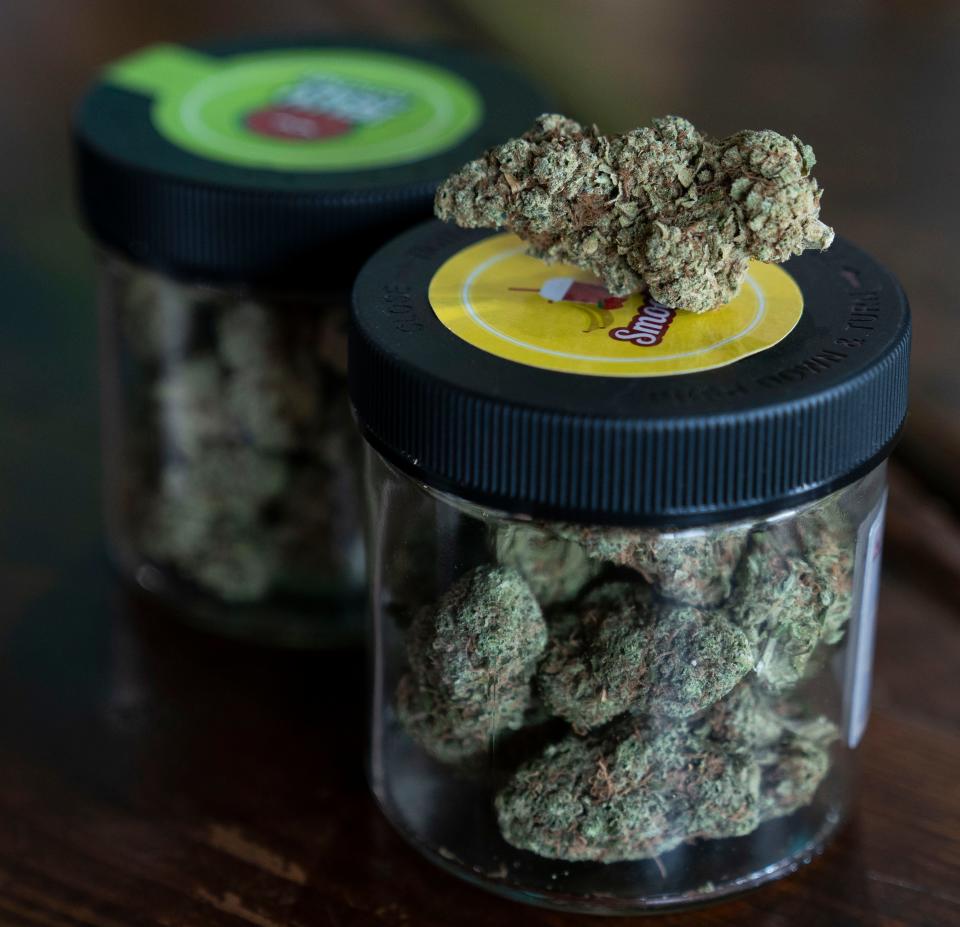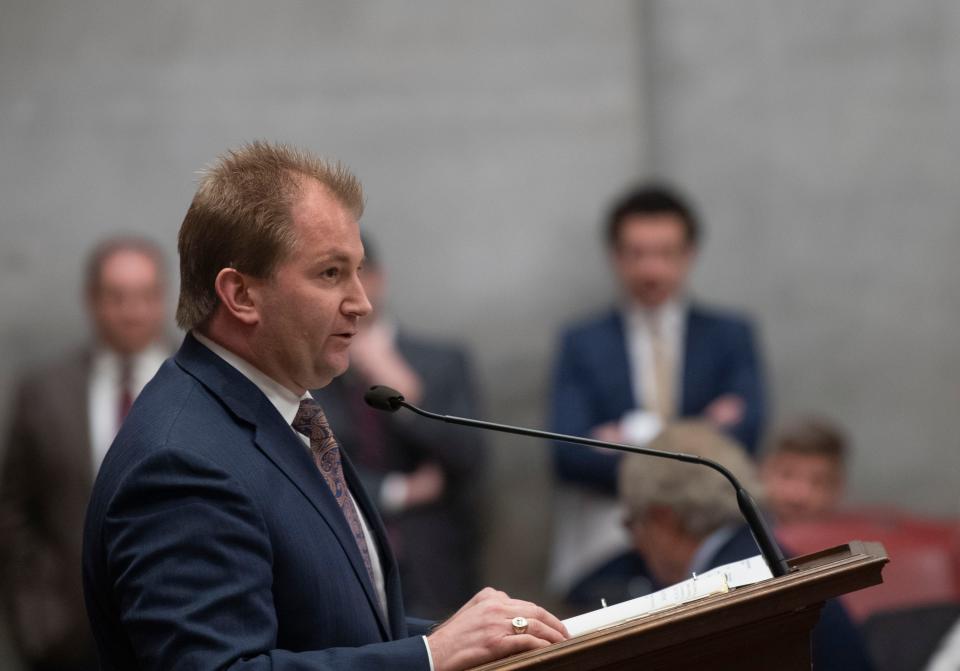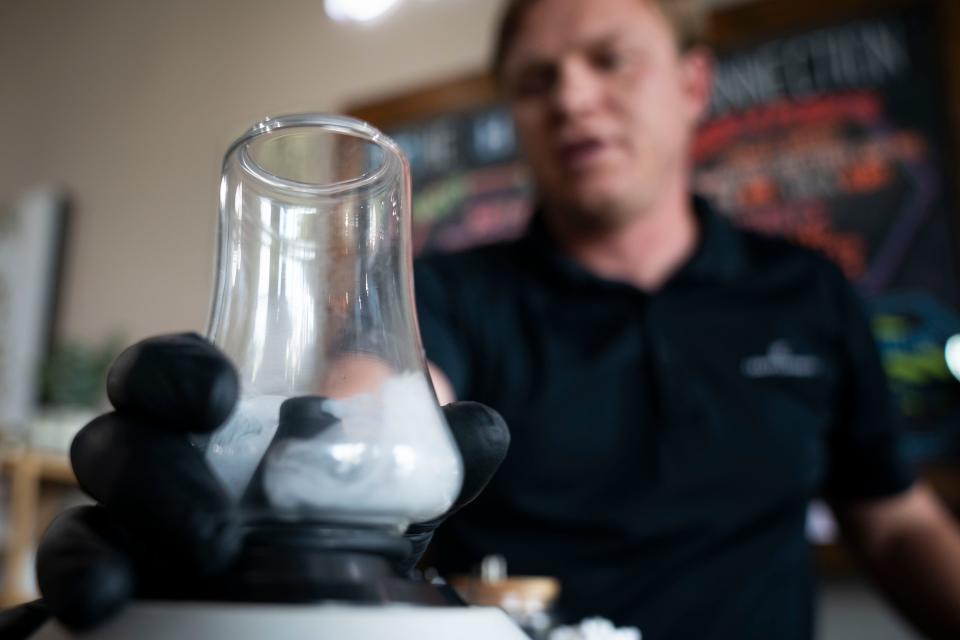Tennessee Gov. Bill Lee signs new law on delta-8 products. Here's what it does.
- Oops!Something went wrong.Please try again later.
Hemp-derived cannabinoid products including delta-8 will soon be illegal to sell to anyone under the age of 21, as Tennessee Gov. Bill Lee has signed a new law to regulate and tax the products for the first time in the state.
Since the 2018 federal farm bill broadly legalized hemp-derived cannabinoid products – including those that can produce a high similar to marijuana – the products have been legal to sell and purchase in Tennessee at any age.
Federal legalization has led to a boom in the sale of products containing cannabidiol (CBD), delta-8 tetrahydrocannabinol, and other hemp-derived compounds.
Unlike several other states, Tennessee had not adopted any regulations on the state’s $200 million hemp-derived goods industry – until last month.
“Right now, a child could walk into a gas station and buy as much delta-8 product – in gummies or edibles or vapes – that they could ever use, and many are overdosing on these products, not fatal overdoses, but still serious negative medical effects to both children and adults,” House Majority Leader William Lamberth, R-Portland, told The Tennessean in an interview.
Lamberth and Sen. Richard Briggs, R-Knoxville, sponsored a bill this year to regulate and tax hemp-derived cannabis products, and prohibit their sale to individuals under 21.

Now signed into law, it will also require stores to move hemp-derived products behind the counter, establish new product testing and packaging requirements, and impose a 6% state tax on the products.
Age restrictions, product location requirements and sales tax will take effect on July 1, while businesses and government agencies have until next year to implement some other regulations.
Marijuana – delta-9 – still remains illegal in Tennessee.
More: Nashville's cannabis industry blooms with hemp expo and growing research firm
The new law follows an unsuccessful effort last year by Briggs and Lamberth to ban hemp-derived products entirely.
“There just wasn’t enough support there to make this broad range of products illegal,” Lamberth said. “We looked at how could we properly regulate them so that we keep these products away from children – so that adults 21 and up, if they purchase these products, there's good labeling there, there's good testing.”
During debate in the legislature, several Democrats argued the state should also legalize marijuana statewide – or if not, that alcohol should also be banned, as it can be more damaging than otherwise legal hemp-derived cannabis products. Despite the arguments, the bill passed with nearly unanimous support in both chambers.

Lamberth said lawmakers set the age requirement to buy the products at 21 to be consistent with other intoxicating substances like alcohol.
Illegal sale of hemp derived products to someone under 21 will be a Class A misdemeanor, punishable by up to a year in jail or a $2,500 fine.
What the new delta-8 law does
The new law will also:
Require sellers and distributors to check proof of age.
Penalize individuals who try to use fake IDs or help underage people obtain restricted products.
Prohibit sales and samples of restricted products on streets, sidewalks, and parks.
Prohibit sale of hemp derived products within 1,000 feet of any K-12 school.
Prohibit retailers from marketing appeals to those under 21, including any ads that feature comic book, video game, television, or movie characters, superheroes, unicorns or other mythical creatures.
Prohibit ingestibles from being formed in the shape of animal or cartoon characters.
Proper labeling and product testing is aimed at setting apart legal hemp-derived products from illegal marijuana.
“It makes it clear that if you have something derived from hemp, it has to have the proper labeling, it has to have the testing it has to have come from, you know, a legitimate source,” Lamberth said. “That way when folks are at least buying these products, they'll know that they're not purchasing something that isn't an illegal product. We don't want someone to inadvertently wind up afoul of the law because they purchased a product they thought was legal, and it turned out it wasn't.”
More than 400 licensed hemp producers in Tennessee
Currently, there are 421 hemp producers licensed by the Tennessee Department of Agriculture, and more than 2,900 acres of land registered with the department for hemp production.
Lamberth said lawmakers consulted with business owners in the industry while drafting the regulations.
“The ones that truly were already doing it the right way where they refuse to sell to minors, they make sure that their products were tested properly, and that their customers knew exactly what they were buying – those business owners were eager to work with us on making sure that we had proper regulations in place,” Lamberth said. “It separated the good from the bad actors.”
Beginning next year, manufacturers and sellers of hemp-derived cannabis products will be required to have a valid license issued by the Department of Agriculture. To qualify for a license, producers must follow state regulations, pay a fee of up to $500, consent to reasonable inspection and sampling, and undergo criminal background checks. Individuals are not eligible for licensure within 10 years of any drug-related felony conviction.
State agencies will conduct random unannounced inspections of manufacturing facilities and seize any non-compliant products.
Tennessee will begin to levy a 6% tax on the retail sale of any hemp-derived cannabis product beginning July 1. Revenue from the new tax will go to the Departments of Revenue and Agriculture to be used toward regulation of hemp-derived products.

The two departments will be required to submit an annual report to the legislature describing industry compliance and enforcement efforts.
“As the hemp industry in Tennessee continues to grow and change, our focus remains on public safety and supporting opportunities to advance the agriculture industry,” Kim Doddridge, public information officer at the Department of Agriculture, told The Tennessean in an email.
Lamberth said he does not anticipate that the new regulations on hemp-derived products will lead to more consideration of legalizing marijuana.
“Not at all,” he said. “This is a totally separate conversation about a product that was inadvertently legalized when we legalized hemp. And now we have to make sure we put some guardrails on it.”
Reach Vivian Jones at vjones@tennessean.com.
This article originally appeared on Nashville Tennessean: Delta-8 in Tennessee: New law regulates marijuana-derived products

